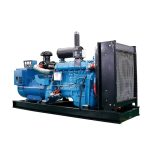Introduction
Diesel generators play a crucial role in providing backup power during outages or in remote locations where electricity supply is unreliable. To ensure the continuous and reliable operation of a diesel generator, proper maintenance and servicing are essential. This comprehensive guide will cover all aspects of maintaining and servicing diesel generators, including routine maintenance tasks, troubleshooting common issues, and best practices for ensuring optimal performance.
funny post : Understanding Diesel Generators
Before delving into maintenance and servicing procedures, it is important to have a basic understanding of how diesel generators work. A diesel generator consists of a diesel engine that drives an alternator to produce electricity. The diesel engine burns diesel fuel to generate mechanical energy, which is then converted into electrical energy by the alternator. Diesel generators are known for their durability, efficiency, and ability to provide continuous power for extended periods.
Chapter 2: Routine Maintenance Tasks
Proper maintenance is key to ensuring the longevity and reliability of a diesel generator. Routine maintenance tasks should be performed regularly to prevent breakdowns and optimize performance. Some of the essential routine maintenance tasks for a diesel generator include:
1. Checking and changing the oil: Regularly check the oil level and quality in the engine. Change the oil as recommended by the manufacturer to ensure proper lubrication and prevent engine wear.
2. Inspecting and replacing filters: Clean or replace the air, fuel, and oil filters at regular intervals to maintain optimal engine performance and fuel efficiency.
3. Testing and replacing the battery: Test the battery regularly to ensure it is in good condition. Replace the battery if it shows signs of deterioration or does not hold a charge.
4. Checking the coolant level: Inspect the coolant level and quality to prevent overheating and ensure proper engine cooling.

5. Inspecting belts and hoses: Check the condition of belts and hoses for signs of wear or damage. Replace any worn-out belts or hoses to prevent belt slippage or coolant leaks.
6. Testing the fuel system: Inspect the fuel system for leaks and ensure the fuel supply is clean and free of contaminants. Test the fuel injectors and fuel pump for proper operation.
Chapter 3: Preventive Maintenance Schedule
Creating a preventive maintenance schedule is crucial for ensuring that all maintenance tasks are performed on time and in an organized manner. A preventive maintenance schedule should outline the frequency of each maintenance task and assign responsibilities to specific personnel. Some of the key components of a preventive maintenance schedule for a diesel generator include:
1. Daily checks: Perform daily visual inspections of the generator to check for any leaks, unusual noises, or warning lights on the control panel.
2. Weekly checks: Inspect the battery, coolant level, and fuel system components on a weekly basis to ensure they are in good condition.
3. Monthly checks: Conduct a more thorough inspection of the generator, including testing the battery, checking the oil level, and inspecting filters, belts, and hoses.
4. Quarterly checks: Perform a complete inspection of the generator, including testing the fuel system, checking the cooling system, and conducting load bank testing to ensure the generator can handle its rated load.
Chapter 4: Troubleshooting Common Issues
Even with regular maintenance, diesel generators can experience issues that require troubleshooting and repair. Understanding common issues and their causes can help in diagnosing and resolving problems quickly. Some of the common issues that diesel generators may experience include:
1. Failure to start: This could be due to a dead battery, fuel supply issues, or a faulty starter motor. Check the battery, fuel system, and starter motor to identify the root cause.
2. Overheating: Overheating can be caused by a low coolant level, a malfunctioning thermostat, or a clogged radiator. Check the coolant level, thermostat, and radiator for any issues.
3. Excessive smoke: Excessive smoke from the exhaust can indicate problems with the fuel injectors, air filter, or combustion process. Inspect the fuel injectors, air filter, and combustion chamber for any issues.
4. Low power output: Low power output can be caused by fuel system issues, dirty filters, or a malfunctioning alternator. Inspect the fuel system, filters, and alternator to identify the cause of the problem.
Chapter 5: Best Practices for Diesel Generator Maintenance
In addition to routine maintenance tasks and troubleshooting common issues, there are several best practices that can help optimize the performance and longevity of a diesel generator. Some of the best practices for diesel generator maintenance include:
1. Keep detailed maintenance records: Maintain a log of all maintenance activities, including dates, tasks performed, and any issues encountered. This information can help in identifying trends and scheduling future maintenance tasks.
2. Follow manufacturer recommendations: Adhere to the manufacturer's maintenance schedule and guidelines for optimal performance and warranty compliance.
3. Conduct regular load bank testing: Regular load bank testing helps verify the generator's capacity and performance under load conditions. This testing can help identify issues before they escalate into major problems.
4. Train personnel: Ensure that personnel responsible for diesel generator maintenance are properly trained and knowledgeable about the equipment. Training can help prevent errors and ensure that maintenance tasks are performed correctly.
Chapter 6: Conclusion
Proper maintenance and servicing are essential for ensuring the reliable operation of a diesel generator. By following a preventive maintenance schedule, troubleshooting common issues, and implementing best practices, diesel generator owners can optimize performance, prevent breakdowns, and extend the lifespan of their equipment. Regular maintenance not only saves costs in the long run but also ensures that the generator is ready to provide backup power when needed. By investing time and resources in maintenance and servicing, diesel generator owners can enjoy peace of mind knowing that their equipment is well-maintained and reliable.
